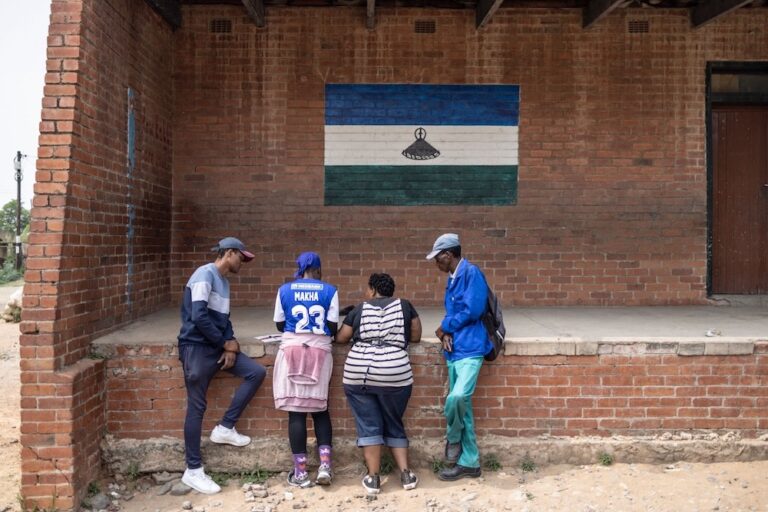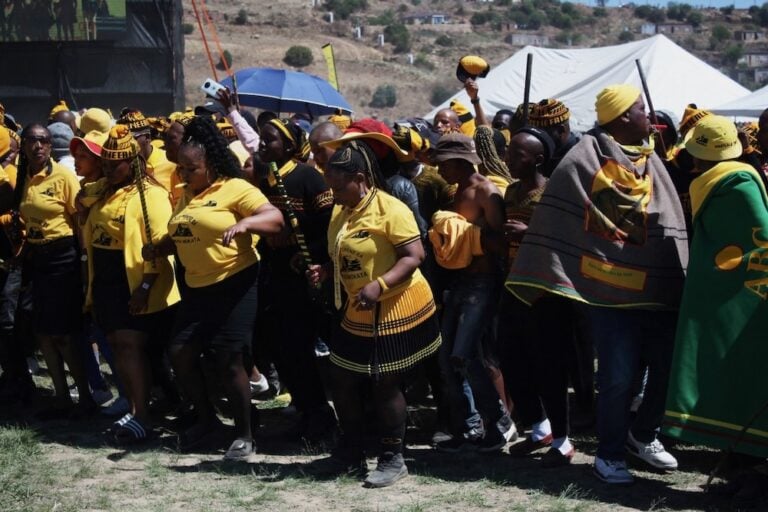(MISA/IFEX) – The editor of “MoAfrika” weekly magazine, Candy Ramainoane, fears that his publication will be plunged into an uncertain future if the sheriff of the court executes another writ allowing for the paper’s assets to be attached in lieu of a defamation judgement against him in December last year. According to Ramainoane, his office […]
(MISA/IFEX) – The editor of “MoAfrika” weekly magazine, Candy Ramainoane, fears that his publication will be plunged into an uncertain future if the sheriff of the court executes another writ allowing for the paper’s assets to be attached in lieu of a defamation judgement against him in December last year.
According to Ramainoane, his office has learned that the plaintiff, Member of Parliament Moeketsi Sello, may seek a court injunction to effect another execution of some of the property from both his office and his home.
On 23 June, two computers belonging to CR Communications, a limited company that publishes the Sesotho weekly, were attached for possible public auction after the editor and the publishers failed to stay off a writ allowing for the assets to be attached. The publication closed down for two weeks but was back on the streets last week. It had borrowed some equipment from an undisclosed “good Samaritan”.
Ramainoane, speaking to “Mopheme” newspaper, said he believed that if more property was taken away for public auction, “it will place us in a difficult situation because we will operate under uncertain circumstances.” He said he would not resist if such an execution was effected again. He argued, though, that the execution was in conflict with the freedom of expression clause in the country’s Bill of Rights, the United Nations conventions on freedom of speech as well as the United Nations Development Programme’s (UNDP) Human Development Report 2000.
Lesotho’s constitution enshrines, among other rights, the right to freedom of expression, while the UNDP reports calls for protection of the independence of the judiciary and the media.
Ramainoane told “Mopheme”: “We take the act as a political warfare against “MoAfrika”. So they are using the courts of law to shut us down because of a run-up to the 2000 election.”
The country is heading for the polls next year. The May 1998 election result came under fierce criticism from opposition parties after the Lesotho Congress for Democracy won seventy-nine seats out of an eighty-member National Assembly.
It is not clear whether any of the goods attached so far have been auctioned off.
Background Information
On 9 June, Ramainoane failed to get the Lesotho High Court to cancel a writ of execution allowing for his assets to be attached in lieu of the defamation judgement against him in December last year. The failure of the court to stop the writ was highly questionable since the judgement against Ramainoane was under appeal, although it has yet to come before the court.
The writ, which was signed by the Registrar of the High Court and Court of Appeal, directed a court official to attach the movable goods of Ramainoane and realise “by public auction” a sum of 139,288 Maloti (about US$20,000), making up the judgement debt and costs of the plaintiff, Sello.
The application to have the writ cancelled was rejected on the grounds that the lawyer had failed to comply with the rules of the court of appeal, the lawyer had failed to advance payment for the preparation of court records, and the lawyer had failed to show prospects of success at the court of appeal.
On 22 December 1999, the Lesotho High Court found Ramainoane liable for defamation in a civil action brought by Sello, a current member of the Lesotho parliament. The civil action followed an anonymous letter to the editor that was published in a September 1996 edition of “MoAfrika”.
The letter in question contained statements to the effect that the former treasurer of the Basotholand Congress Party (BCP), Shakhane Mokhehle (currently the minister of law, justice and constitutional affairs) had embezzled party funds and used them together with the plaintiff while the two were living in exile in Botswana. The letter also stated that the two (Mokhehle and Sello) had bribed Botswana police who had arrested them for illegal diamond dealing in Botswana in 1980. These “facts”, the author of the letter said, were quoted from a book entitled “Lesotho and the Struggle for Azania”, written by Bernard Leeman.
Ramainoane’s refusal to disclose the name and particulars of the author of the published letter led to the suit.
The court concluded that Ramainoane was unable to prove the truth of the statements and to show that what was said in the letter was an expression of opinion, and was therefore unable to defend his arguments of justified defamation and fair comment.


